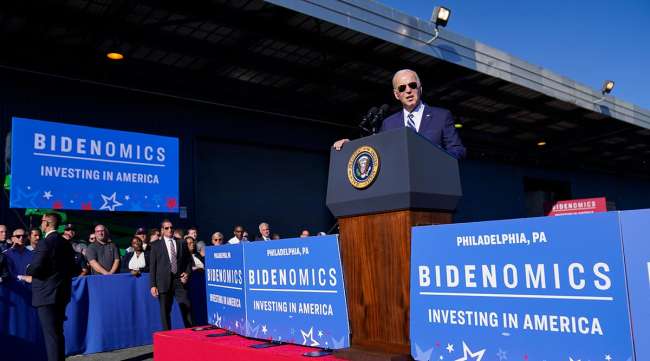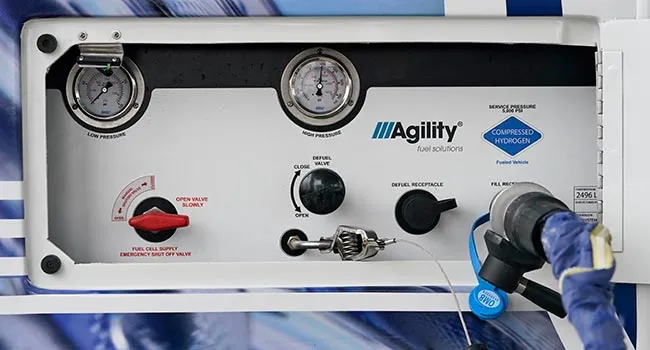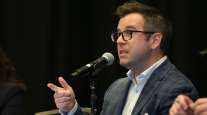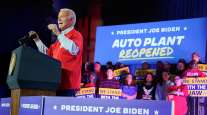Staff Reporter
Biden Awards $7 Billion for Clean Hydrogen Hubs Across US

[Stay on top of transportation news: Get TTNews in your inbox.]
Shifting America away from fossil fuel vehicles took a big step Oct. 13 with President Joe Biden announcing that seven state-backed regional hubs will receive a total of $7 billion for hydrogen fuel production and infrastructure for vehicles mostly on drawing boards in his ambitious push for zero-emission green energy.
Following the White House announcement about hydrogen hubs, Biden traveled to Philadelphia where he mostly spoke about how his policies will create good jobs, particularly union ones, as a result of transformational “made-in-America” investments in products and infrastructure.
“I came to office determined to get this country up again so we can face the existential threat of climate [change] and still grow to fundamentally change our economy and transition this country to a clean energy future. Today’s announcement was all part of a bigger vision to do just that,” Biden said, adding that the investment “we’re making today will be for our kids and grandkids” with big historic projects. “Today’s announcement is transformational,” Biden added.
Earlier, Energy Secretary Jennifer Granholm said the historic hydrogen hub investment “is laying the foundation for a new, American-led industry that will propel the global clean energy transition while creating high quality jobs and delivering healthier communities in every pocket of the nation.”
Pennsylvania, Delaware and New Jersey
The East Coast will have the Mid-Atlantic Hydrogen Hub (MACH2) with Pennsylvania, Delaware and New Jersey. A key partner is the Port of Virginia. MACH2 will seek to “build out” infrastructure for production (using electrolysis energy sources such as nuclear energy and renewable natural gas). It also intends to establish liquid hydrogen depots, refueling stations for heavy duty vehicles, hydrogen-fueled trucking (gaseous and liquid), pipelines, storage and liquefiers. Set to receive up to $750 million, the MACH2 hub expects to create 20,800 direct jobs, of which 6,400 would be permanent jobs.
West Virginia, Ohio and Pennsylvania
The Appalachian Regional Hydrogen Hub (ARCH2) will cover West Virginia, Ohio and Pennsylvania in a strategic hydrogen storage and distribution center for developing pipelines, fueling stations and permanent carbon-dioxide repositories.
WATCH: America is finally recognizing #WV's strength as America’s Energy Powerhouse. WV has always answered our nation’s call, and now — as our nation strives for energy security — WV will continue its proud legacy as the home of the Appalachian Regional Clean Hydrogen Hub. pic.twitter.com/OAMJyGyGah — Senator Joe Manchin (@Sen_JoeManchin) October 13, 2023
Sen. Joe Manchin (D-W.Wa.) expressed gratitude for the federal investment up to $925 million for ARCH2. “This means West Virginia will be the new epicenter of hydrogen in the United States of America,” Manchin said.
Minnesota, North Dakota and South Dakota
A pair of hubs will be located in the nation’s farm belt: the Heartland Hydrogen Hub with Minnesota, North Dakota and South Dakota plus the Midwest Alliance for Clean Hydrogen (MachH2) featuring Illinois, Indiana and Michigan.
The Heartland Hydrogen Hub, also awarded up to $925 million, will leverage the region’s abundant energy resources to decarbonize agricultural fertilizer production, lower regional hydrogen costs and use hydrogen to generate electricity for cold climate heating.

A hydrogen fuel cell bus is refueled at a fueling station. (Tony Dejak/Associated Press)
Gov. Doug Burgum noted, “North Dakota is already an energy and ag powerhouse, and we’re excited to build on our reputation as states that feed and fuel the world with environmental stewardship and a focus on innovation over regulation to meet our nation’s evolving energy needs.”
Sen. Tina Smith of Minnesota said, “The clean energy transition is happening — the question is whether we lead or follow. I want us to lead.”
We're unlocking innovation and new sources of energy that will benefit our whole state while creating good-paying jobs to power Minnesota for years to come. @TinaSmithMN and I secured federal funds to make Minnesota one of seven hydrogen hubs nationwide. https://t.co/y7BJ2ybz4z — Amy Klobuchar (@amyklobuchar) October 13, 2023
MachH2 will benefit by being in a key industrial and transportation corridor. There hydrogen will be used to strategically help decarbonize heavy-duty transportation, steel and glass production, power generation and refining. This hub will receive up to $1 billion and produce hydrogen by leveraging diverse energy sources such as renewables, natural gas and nuclear energy.
Illinois, Indiana and Michigan
Indiana Gov. Eric Holcomb said, “Indiana and the Midwest at large possess all the components critical for a successful and inclusive hydrogen economy. Among them, Indiana’s world-class universities that offer leading research and development and create a highly skilled workforce ready to get to work building a new hydrogen ecosystem ripe for growth.”

Whitmer
Noting that Michigan is a national leader in electric vehicle projects, Gov. Gretchen Whitmer said the state “is proud to work with our neighbors to build up our hydrogen industry and lead the future of the emerging clean energy sector.”
MachH2 members include Nikola Corp., Oshkosh Corp. and its wholly owned subsidiary Pratt Miller and the Detroit Wayne County Port Authority.
Texas
The Gulf Coast hydrogen hub will be centered in Houston through the HyVelocity Hydrogen Hub, which will receive up to $1.2 billion from the DOE. With more than 1,000 miles of dedicated hydrogen pipelines, 48 hydrogen production plants and dozens of hydrogen end-use applications, the Gulf Coast is seen as an ideal hydrogen infrastructure base.
Rich Byrnes, chief infrastructure officer at the Port of Houston, a HyVelocity partner, reacted, “Clearly the Houston region’s unique combination of innovation, capital, infrastructure and will to drive the energy transition will deliver cleaner transportation, lower emissions and economic and environmental value for the next generation.”
California
The remaining two hydrogen hubs will be located on the West Coast: California’s Alliance for Renewable Clean Hydrogen Energy Systems (ARCHES) and the Pacific Northwest Hydrogen Hub (PNW H2) led by Washington state, Oregon and Montana.
Excited to announce that the California Hydrogen Hub has been selected for award negotiations by @ENERGY!
The California Hydrogen Hub will create 220,000 good-paying jobs while increasing CA’s leadership in clean energy and strengthening our nation’s energy security as a whole. pic.twitter.com/3ZK87nftvx — Rep. Linda Sánchez (@RepLindaSanchez) October 13, 2023
ARCHES, which will receive up to $1.2 billion, was chosen to provide a “blueprint for decarbonizing public transportation, heavy duty trucking and port operations — key emissions drivers in the state and sources of air pollution that are among the hardest to decarbonize,” according to a White House statement. Its partners include Amazon, Hyzon Motors, Nikola, General Motors, Vopak, Michelin, the ports of Oakland and Long Beach, and California’s business and economic development office.
Washington, Oregon and Montana
Amazon is also a Pacific Northwest partner in the PNW H2 hub, awarded up to $1 billion. Other partners are Mitsubishi Power Americas Inc. and the Northwest Seaport Alliance.
A Washington State Department of Commerce announcement stated the PNW will focus on decarbonizing the region’s hard-to-electrify heavy-duty transportation, long-duration energy storage, ports, agriculture and industrial operations.
Want more news? Listen to today's daily briefing below or go here for more info:




